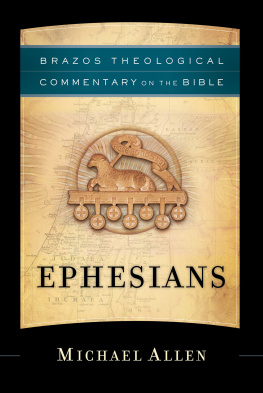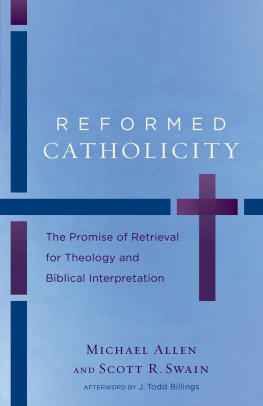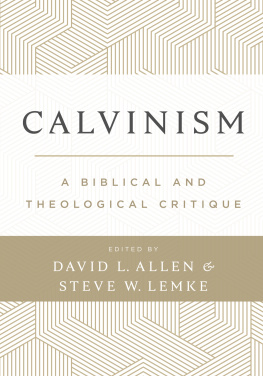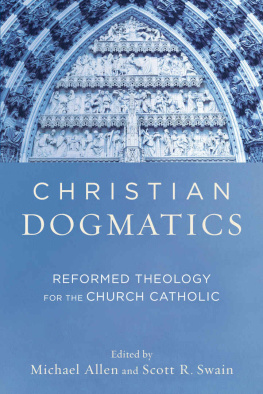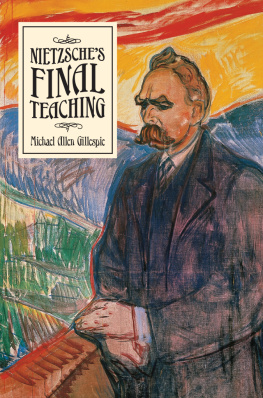Michael Allen Gillespie - The Theological Origins of Modernity
Here you can read online Michael Allen Gillespie - The Theological Origins of Modernity full text of the book (entire story) in english for free. Download pdf and epub, get meaning, cover and reviews about this ebook. year: 2008, publisher: University of Chicago Press, genre: Religion. Description of the work, (preface) as well as reviews are available. Best literature library LitArk.com created for fans of good reading and offers a wide selection of genres:
Romance novel
Science fiction
Adventure
Detective
Science
History
Home and family
Prose
Art
Politics
Computer
Non-fiction
Religion
Business
Children
Humor
Choose a favorite category and find really read worthwhile books. Enjoy immersion in the world of imagination, feel the emotions of the characters or learn something new for yourself, make an fascinating discovery.

- Book:The Theological Origins of Modernity
- Author:
- Publisher:University of Chicago Press
- Genre:
- Year:2008
- Rating:4 / 5
- Favourites:Add to favourites
- Your mark:
- 80
- 1
- 2
- 3
- 4
- 5
The Theological Origins of Modernity: summary, description and annotation
We offer to read an annotation, description, summary or preface (depends on what the author of the book "The Theological Origins of Modernity" wrote himself). If you haven't found the necessary information about the book — write in the comments, we will try to find it.
The Theological Origins of Modernity — read online for free the complete book (whole text) full work
Below is the text of the book, divided by pages. System saving the place of the last page read, allows you to conveniently read the book "The Theological Origins of Modernity" online for free, without having to search again every time where you left off. Put a bookmark, and you can go to the page where you finished reading at any time.
Font size:
Interval:
Bookmark:
THE THEOLOGICAL ORIGINS OF MODERNITY
The Theological Origins of Modernity
MICHAEL ALLEN GILLESPIE
The University of Chicago Press Chicago and London
Michael Allen Gillespie is professor of philosophy and the Jerry G. and Patricia Crawford Hubbard Professor of Political Science at Duke University and the author of Hegel, Heidegger, and the Ground of History and Nihilism before Nietzsche, both published by the University of Chicago Press.
The University of Chicago Press, Chicago 60637
The University of Chicago Press, Ltd., London
2008 by The University of Chicago
All rights reserved. Published 2008
17 16 15 14 13 12 11 10 09 08 1 2 3 4 5
ISBN -13: 978-0-226-29345-5 (cloth)
ISBN -10: 0-226-29345-9 (cloth)
Library of Congress Cataloging-in-Publication Data
Gillespie, Michael Allen.
The theological origins of modernity / Michael Allen Gillespie.
p. cm.
Includes bibliographical references.
ISBN-13: 978-0-226-29345-5
ISBN-10: 0-226-29345-9
1. Philosophy, Modern. 2. Philosophy and religion.
I. Title.
B791.g55 2008
190dc22
2007041303
Is this the Region, this the Soil, the Clime,
Said then the lost Arch-Angel, this the seat
That we must change for Heavn, this mournful gloom
For that celestial light? Be it so, since he
Who now is Sovran can dispose and bid
What shall be right: fardest from him is best
Whom reason hath equalld, force hath made supreme
Above his equals. Farewell happy Fields
Where Joy for ever dwells: Hail horrors, hail
Infernal world, and thou profoundest Hell
Receive thy new Possessor: One who brings
A mind not to be changd by Place or Time.
The mind is its own place, and in itself
Can make a Heavn of Hell, a Hell of Heavn.
What matter where, if I be still the same,
And what I should be, all but less than hee
Whom Thunder hath made greater? Here at least
We shall be free; thAlmighty hath not built
Here for his envy, will not drive us hence:
Here we may reign secure, and in my choice
To reign is worth ambition though in Hell:
Better to reign in Hell, than serve in Heavn.
MILTON, Paradise Lost, 1.24263
CONTENTS
PREFACE
Ours is a visual age, and in the last twenty years two images have shaped our understanding of the times in which we live. The first was the fall of the Berlin Wall and the second the collapse of the World Trade Center towers. These structures were not mere artifacts; they were also symbols deeply embedded in the public psyche. The first was the symbol of totalitarianism and the Cold War confrontation between a free and an enslaved world; the second the symbol of a liberal world unified by the forces of globalization. The fall of the Berlin Wall gave rise to a belief in a liberal future of peace and prosperity that revived a faith in human progress that the catastrophic events of the first part of the twentieth century had almost extinguished. The collapse of the Twin Towers, by contrast, kindled the fear of a rampant new fanaticism that threatened our lives and civilization in an especially insidious way. When the Wall came down, the future seemed to stretch out before us like a broad highway leading to a modern world united by commerce, the free exchange of ideas, and the proliferation of liberal government. This was to be the age of globalization, but a globalization that was conceived as the spread of Western values and institutions to the rest of the world. Science and technology would establish a realm of peace and prosperity in which human freedom could be finally and fully realized. With the destruction of the World Trade Center, globalization suddenly appeared in a new light, not as a one-way street to modernity but as a complex and confusing intersection of paved roads, dark alleys, and mountain pathways. As a result, we ceased to look forward to a new golden age and glanced instead over our shoulders and sideways into the out-of-the-way places we imagined to be filled with dark figures waiting to attack us.
The attack on the World Trade Center thus called the modern project into question, and it did so in a new and unsettling way. The perpetrators seemed to be opposed to modernity not because it had failed to live
What then is modernity, and where did it come from? The conventional wisdom on this matter is quite clear: modernity is a secular realm
Can we still be satisfied with these answers? There are a number of reasons to doubt the adequacy of such accounts. This account is after all the self-congratulatory story that modernity tells about itself and its own origins. As a result, previous attempts to identify modernity as subjectivity, or the conquest of nature, or secularization have begun to look one-sided and inadequate.
This book is an examination of the origins of modernity that is informed by this new scholarship and that seeks to demonstrate the importance of understanding the origins of modernity for coming to terms with the problems we now confront in our globalizing world. It is especially concerned to demonstrate the central role that religion and theology played in the formation of the idea of modernity. This view, of course, is not typically a part of the modern story. Indeed, since the time of the Enlightenment modernity has thought of itself as an effort to suppress religious superstition and authority, encapsulated in Voltaires famous imperative: crasez linfame! In Europe this has meant a continual diminution of the importance of religion, confining it first within the bounds of reason alone, as Kant put it, then attempting to put it out of its misery by declaring God was dead, and culminating in the exceptional decline in religious belief and practice in the latter half of the twentieth century. Even in America, where religion continues to play a much more important role than in Europe, the attachment to religion is often perceived, especially by intellectuals and academics, as atavistic and unseemly, especially when it takes on a fundamentalist or evangelical tone. And even in America, the idea that religion should guide public life continues to meet widespread opposition.
This opposition to religion in the modern age, however, should not be taken as a proof that at its core modernity is antireligious. It is certainly true that modernity has consistently struggled against certain forms of re ligious doctrine and practice, including the cult of the saints, teleology, the natural law teachings of scholasticism, the geocentric vision of the natural world, and creationism, but I want to suggest that this does not mean that it was therefore a rejection of religion as such. The argument presented in this book suggests that it is a mistake to imagine that modernity is in its origins and at its core atheistic, antireligious, or even agnostic. Indeed, I will show in what follows that from the very beginning modernity sought not to eliminate religion but to support and develop a new view of religion and its place in human life, and that it did so not out of hostility to religion but in order to sustain certain religious beliefs. As we shall see, modernity is better understood as an attempt to find a new metaphysical/theological answer to the question of the nature and relation of God, man, and the natural world that arose in the late medieval world as a result of a titanic struggle between contradictory elements within Christianity itself. Modernity, as we understand and experience it, came to be as a series of attempts to constitute a new and coherent metaphysics/theology. I will argue further that while this metaphysical/theological core of the modern project was concealed over time by the very sciences it produced, it was never far from the surface, and it continues to guide our thinking and action, often in ways we do not perceive or understand. I will argue that the attempt to read the questions of theology and metaphysics out of modernity has in fact blinded us to the continuing importance of theological issues in modern thought in ways that make it very difficult to come to terms with our current situation. Unless and until we understand the metaphysical/theological core of modernity, we will remain unable to understand religiously motivated antimodernism and our response to it. The current confrontation thus demands of us a greater understanding of our own religious and theological beginnings, not because ours is the only way, but in order to help us understand the concealed wellsprings of our own passions as well as the possibilities and dangers that confront us.
Next pageFont size:
Interval:
Bookmark:
Similar books «The Theological Origins of Modernity»
Look at similar books to The Theological Origins of Modernity. We have selected literature similar in name and meaning in the hope of providing readers with more options to find new, interesting, not yet read works.
Discussion, reviews of the book The Theological Origins of Modernity and just readers' own opinions. Leave your comments, write what you think about the work, its meaning or the main characters. Specify what exactly you liked and what you didn't like, and why you think so.



